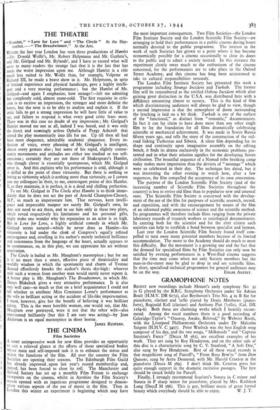THE CINEMA
Film Societies
A MOST unimpressive week for new films provides an opportunity to cast a relieved glance at the efforts of those specialised bodies Whose main and self-imposed task it is to enhance the status and Widen the functions of the film. All over the country the Film Societies are opening their seasons. The Edinburgh Film Guild has already improved .upon last year's record membership and, indeed, has been forced to close its roll. The Manchester and Salford Society has set up a monthly Film Forum to exchange viewpoints on the cinema, whilst in Ayrshire the Film Society's season opened with an ingenious programme designed to demon- strate various aspects of the use of music in the film. Then in London this winter an experiment is beginning which may have the most important consequences. Two Film Societies—the London Film Institute Society and the London Scientific Film Society—are arranging to hold their performances in a public cinema during hours normally devoted to the public programme. The interest in the work of such Societies has. grown to a point where it has become economically possible for a cinema occasionally to close its doors to the public and to admit a society instead. In this instance the experiment clearly owes much to the enthusiasm of the cinema concerned, for the performances are to take place in the Oxford Street Academy, and this cinema has long been accustomed to take its cultural responsibilities seriously.
The London Film Institute Society has pfesented this week a programme including Strange Incident and Turksib. The former film will be remembered as the retitled Oxbow Incident which after gaining great distinction in the U.S.A. was distributed here with a diffidence amounting almost to secrecy. This is the kind of film which discriminating audiences will always be glad to view, though a second impression is that the atmosphere of doom surrounding the lynching is laid on a bit thick. Turksib is one of the earliest of the "functional," as distinct from "romantic," documentaries. In fact it can lay claim to have done more than any other single film to lay the foundation for all films dramatically celebrating scientific or mechanical achievement. It was made in Soviet Russia fifteen years ago, and tells the story of the construction of the rail- road linking Turkestan and Siberia. A silent film depending for its shape and continuity upon imaginative assembly on the editing bench, it finds its drama exclusively in the economic problems pre- sented and in what their solution signifies for the developing Soviet civilisation. The beautiful sequence of a Nomad tribe breaking camp today makes more impression than the devices of " montage ' which were so celebrated in their day. The technique has dated, but it was interesting the other evening to watch how, after a few sequences, the film compelled the acceptance of its own convention.
The purpose of the London Scientific Film Society (and of the increasing number of Scientific Film Societies throughout the country) is less to revive old films than to popularise new and unusual ones. The Scientific Film Society is concerned with the develop- ment of the use of the film for purposes of scientific research, record, and exposition, and with the encouragement by means of the film of an informed public awareness of science and the scientific method. Its programmes will therefore include films ranging from the private laboratory records of research workers to sociological documentaries. In catering both for the scientist and for the alert citizen such societies can help to establish a bond between specialist and layman.
Last year the London Scientific Film Society found itself com- pelled to turn away many potential members because of its limited accommodation. The move to the Academy should do much to meet this difficulty. But the movement is a growing one and the fact that the demand for specialised films by Film Societies can only now be satisfied by evening performances in a West-End cinema suggests that the time may come when not only Society members but the man-in-the-street may be glad to drop in and see scientific films. In short, specialised technical programmes for general audiences may


























 Previous page
Previous page